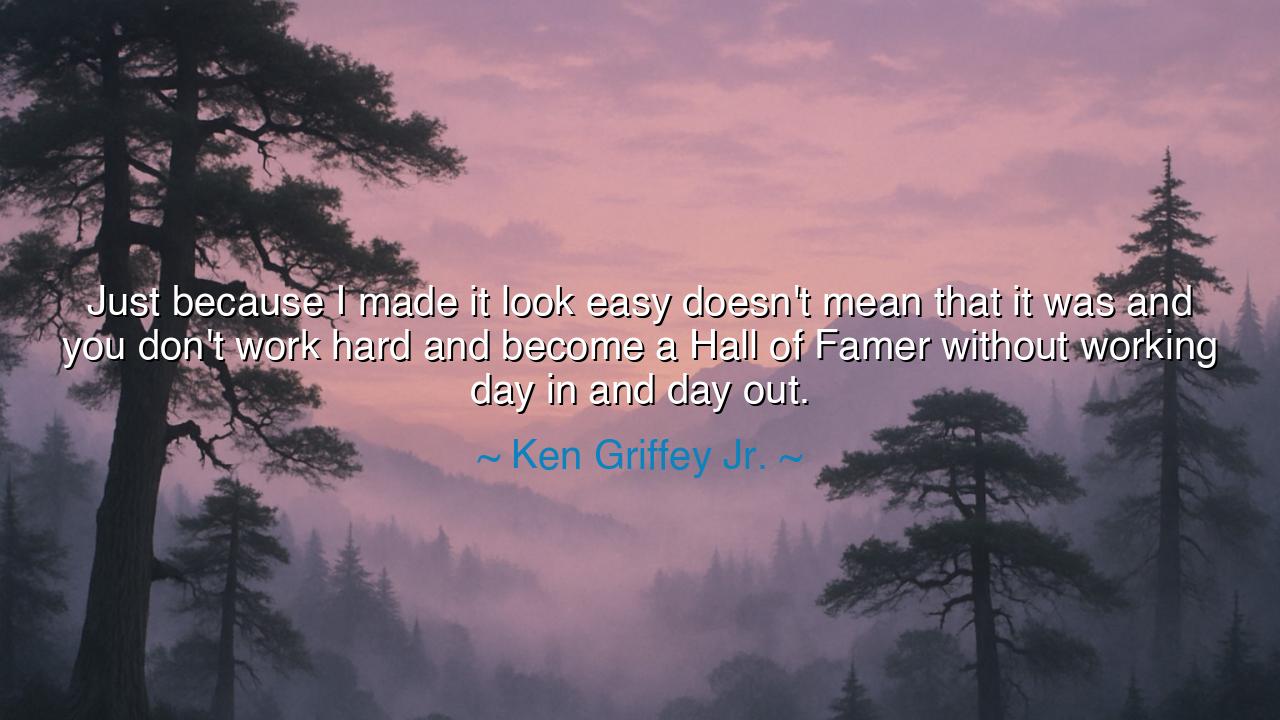
Just because I made it look easy doesn't mean that it was and
Just because I made it look easy doesn't mean that it was and you don't work hard and become a Hall of Famer without working day in and day out.






Hear the words of Ken Griffey Jr., who spoke with the humility of a master: “Just because I made it look easy doesn’t mean that it was, and you don’t work hard and become a Hall of Famer without working day in and day out.” In these words lies the eternal truth that excellence, though it may appear effortless to the eye, is always purchased through toil unseen.
He speaks of making it look easy, for grace often conceals labor. The swing that seems natural, the catch that seems inevitable, are not the gifts of chance but the fruit of uncounted hours of repetition and devotion. The world marvels at the performance, but the performer remembers the sweat, the sacrifice, and the struggle that gave birth to beauty.
Griffey reminds us that no one ascends to the Hall of Fame—that temple of greatness—by talent alone. It is the daily discipline, the working day in and day out, that forges champions. What is done in the solitude of practice shines later under the gaze of the crowd, but without the hidden labor, the glory would never come.
The wisdom here is twofold: first, that the world often mistakes mastery for ease, not seeing the countless steps that led to it; second, that true greatness is built not in moments of triumph, but in the relentless grind of preparation. The appearance of effortlessness is not the absence of effort, but its perfection.
Therefore, O seekers, remember: do not be deceived when greatness appears natural. Behind every graceful motion, every shining achievement, lies a foundation of perseverance. In Griffey’s words we hear the wisdom of the ancients—that destiny favors not only the gifted, but above all the diligent, who labor without ceasing until their craft becomes second nature. Would you like me to shape this into a parable of the dancer and the crowd, where what seemed like ease was revealed to be discipline in disguise?






KTTràn Mỹ Trang Ké toán
Ken Griffey Jr. talks about making greatness look easy, but his words remind us of the truth that true success comes from dedication and consistent effort. I think it’s easy for us to admire someone’s talent but forget that success isn’t just about natural gifts—it’s about the discipline behind it. What do we learn from this in terms of our own goals? How can we apply the same relentless work ethic to our personal or professional aspirations?
PHTran Phuoc Hao
Ken Griffey Jr.’s comment about the effort behind his success challenges the common misconception that talent alone is enough. It’s so easy to assume that elite athletes like Griffey just coasted to the top, but in reality, they grind every single day. What other factors contribute to making the work feel effortless on the outside? Is it just years of practice, or is there also a mental and emotional element to pushing through tough times?
Llan
Ken Griffey Jr. brings up an important point about the unseen work behind success. Many people see the highlight reels and think it’s all effortless, but there’s so much more to the story. It’s a stark reminder that reaching the top—whether in sports or any field—requires day-in, day-out dedication. I wonder, though, how does one maintain the discipline and motivation to keep working hard every day? What keeps someone going through all the challenges?
UVNguyen Hoang Uyen Vy
Ken Griffey Jr.’s quote about the hard work behind his success is a great reminder that things aren’t always as easy as they seem. I think people sometimes forget that even the most naturally gifted individuals have to work incredibly hard. How do we balance the idea of natural talent versus effort in success? Can someone truly excel without both, or does one outweigh the other in the long run?
PHPhuc Ho
Ken Griffey Jr. acknowledges the hard work that goes into making greatness seem effortless, and I think this is so important for anyone striving for success. It’s easy to think that someone becomes a Hall of Famer without effort, but the truth is far more complex. How do we as a society often undervalue the effort behind visible success? How do we make sure we respect and appreciate the behind-the-scenes grind?